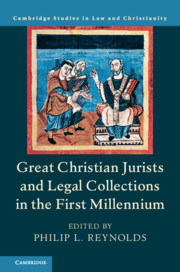Book contents
- Great Christian Jurists and Legal Collections in the First Millennium
- Law and Christianity
- Great Christian Jurists and Legal Collections in the First Millennium
- Copyright page
- Contents
- Contributors
- Preface and Acknowledgments
- Abbreviations
- Part I
- Part II
- 10 Lactantius
- 11 Ambrosiaster
- 12 Augustine of Hippo
- 13 Leo the Great
- 14 Gelasius I
- 15 Dionysius Exiguus
- 16 Benedict’s Rule
- 17 Gregory the Great
- 18 Isidore of Seville
- 19 Pseudo-Isidorus Mercator
- 20 Jonas of Orléans
- 21 Hincmar of Reims
- 22 Regino of Prüm
- 23 Burchard of Worms
- 24 New Horizons in Church Law
- Index
- References
17 - Gregory the Great
from Part II
Published online by Cambridge University Press: 21 June 2019
- Great Christian Jurists and Legal Collections in the First Millennium
- Law and Christianity
- Great Christian Jurists and Legal Collections in the First Millennium
- Copyright page
- Contents
- Contributors
- Preface and Acknowledgments
- Abbreviations
- Part I
- Part II
- 10 Lactantius
- 11 Ambrosiaster
- 12 Augustine of Hippo
- 13 Leo the Great
- 14 Gelasius I
- 15 Dionysius Exiguus
- 16 Benedict’s Rule
- 17 Gregory the Great
- 18 Isidore of Seville
- 19 Pseudo-Isidorus Mercator
- 20 Jonas of Orléans
- 21 Hincmar of Reims
- 22 Regino of Prüm
- 23 Burchard of Worms
- 24 New Horizons in Church Law
- Index
- References
Summary
During Gregory I’s papacy (590–604), Rome was the final court of appeal for disputes over matters such as property, debt, marriage, and inheritance. Gregory pursued a judicial philosophy of moderation, discretion, and compassion. He urged judges to consider such mitigating circumstances as poverty, marital status, family history, and age. Judgments were relative, and even the law itself was sometimes best kept when suspended. In cases of reasonable doubt, it was wrong to judge as if there was certainty. Gregory required judges to think the best of defendants unless they knew otherwise. Power lay with the imperial court in Constantinople, whose archbishop claimed to be “ecumenical patriarch.” Gregory claimed moral leadership as Peter’s successor, but his political perspective was Byzantine, so that the emperor’s role in the church was beyond dispute. In Gregory’s “Christian empire” or “holy commonwealth,” church and empire constituted a single body of Christ.
Keywords
- Type
- Chapter
- Information
- Publisher: Cambridge University PressPrint publication year: 2019

